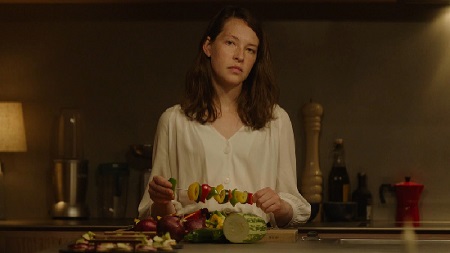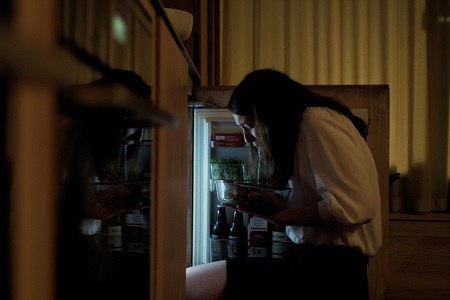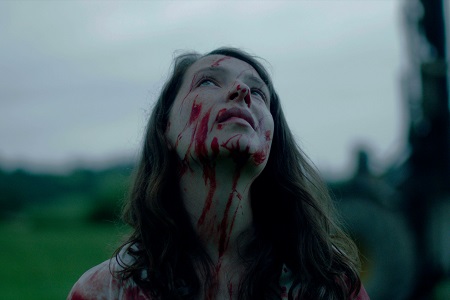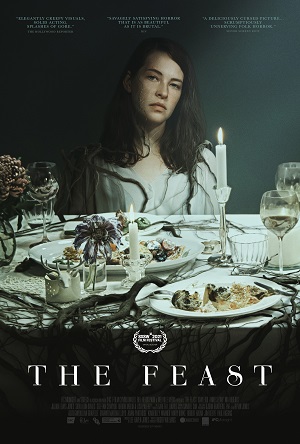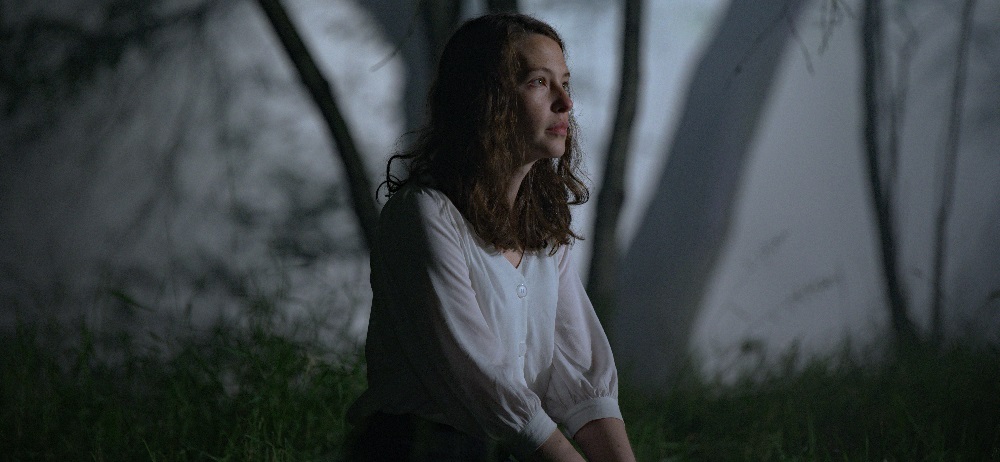
“The Feast” – Interview with Lee Haven Jones and Annes Elwy
by Sara Michelle Fetters - November 19th, 2021 - Interviews
A Welsh Feast
Cooking up a horrific tale of heritage, culture and vengeance with director Lee Haven Jones and actress Annes Elwy
One lonely night in the middle of a secluded patch of the Welsh countryside, a wealthy family is having a dinner party for the farmer neighbors to discuss a potential business opportunity. Matriarch Glenda (Nia Roberts) has pulled out all the stops, insisting that her two adult sons — one a doctor training for a triathlon (Steffan Cennydd), the other a disaffected loner struggling with addiction issues (Sion Alun Davies) — be on their best behavior, while her politician husband (Julian Lewis Jones) has shot a wild rabbit he hopes will be served as part of the meal.
Assisting them for the evening is Cadi (Annes Elwy), a lovely cook and housemaid who has been recommended to Glenda by one of her friends. But Cadi arrives seemingly by foot and is dirty from her trek up to the house. Nevertheless, after cleaning her up, Glenda puts the young woman to work immediately, and neither she nor the rest of the family questions why she would arrive for a job in such a disheveled state.
A chilling tale born from Welsh folklore, the disquieting horror yarn The Feast is a slow-burn descent into madness that also happens to be an observational social satire that packs a pretty mean wallop. It is a tasty treat of terror that has a great deal to say about the world, and humanity’s self-destructive place in it, by the time things reach their peacefully apocalyptic conclusion.
I sat down with director Lee Haven Jones and actress Annes Elwy to chat about their twisted little sojourn into the unknown. The following are edited transcripts of what they had to say:
Sara Michelle Fetters: Lee, what was it about this story that got you interested in making the film?
Lee Haven Jones: I kind of always wanted to make a feature, and I always wanted to make a Welsh-language feature. I also wanted to… share the heritage and culture of Wales with the world. It seemed to me that this was a great opportunity to do that.
It’s sort of an amalgam of different kinds of folkloric Welsh tales, but also it has a very… contemporary edge. It has a message that, it seems to me, is global. It does… try to talk about that sort of environmental catastrophe that’s staring us in the face. So it seemed to have everything going for it, really.
SMF: Annes, what was it that for you that attracted you initially to Cadi?
Annes Elwy: It was instantly [apparent] that this was a script like something I’d never read before. Cadi’s a part that doesn’t speak very much, and yet she has all this influence over everybody. Obviously, as an actress, that’s quite appealing.
But like Lee said, it’s a really Welsh production, and the script is unapologetically Welsh. That’s really rare. It’s fully Welsh. There’s no English, and also… Welsh folklore is such a big theme. So it’s a combination of all the things I’m really passionate about, and the script was really cool and exciting. This is one of those things I know I could have gone to watch and been absolutely gutted that I wasn’t part of. I’m just really lucky that I was. [laughs]
SMF: I was trying to describe this film to some friends and talk to them about how much I loved it. I ended up describing it as this crazy combination The Hallow and The Discreet Charm of the Bourgeoisie. I wonder, what were the conversations between you two like when you were discussing, not just the film, but the character and how you wanted Cadi portrayed?
AE: How many human traits does she have? How many social cues does she pick up on? All of those things…. I think we disagreed slightly in the beginning of how much she would be able to imitate different characters. Whether she knows how to be humorous. Those sort of things. But very quickly we fell into the right swing of things, I think.
LHJ: Yeah. I’d forgotten about our slightly different interpretation.
The touchstone for me, with regards to Cadi, was Scarlett Johansson’s character in Under the Skin. Like Annes said, the questions surrounding her are about how much does she give away? I’m slightly obsessed as a director with the power of suggestion and with ambiguity. I think my… constant default notes were to embrace the ambiguity of a sequence or of a scene or of a situation.
The other thing I’m obsessed with is reception theory, and how audiences bring their own baggage to bear and… project their own thoughts and feelings onto drama. I was keen to… allow the space for that to happen. I think it was Jacques Derrida who said, “Meaning is a function of context.” So, yeah, by putting all of these images together, then the audience sort of fills in the gaps.
SMF: And that’s kind of the great thing about the film. We know as an audience something is up. Someone that is supposed to be there to help out for this dinner doesn’t just necessarily appear right on the lawn as if out of thin air. So we know something’s up. But there is such a slow burn to it. It’s putting pieces together: how does she fit in with this family and what are her intentions?
I feel like for you, Annes, there is such an observational curiosity to Cadi. It’s as if she’s trying to figure out herself what she’s going to do throughout the film. Deciding what this family deserves. Am I reading too much into that?
AE: I think it’s not wrong. Definitely. I think Cadi’s a very caring person. Obviously, she does these evil things, but maybe for the greater good. And you see that in when she saves Gweirydd’s life, too. She is a mixture of all these different emotions. She is predominantly Nature, but the human element comes maybe second.
LHJ: What you’re saying about the slow-burn nature of it, and the fact that we do seed a lot of the story visually very early on — but it’s only with the benefit of hindsight that you realize what’s happened — this does demand a lot from an audience.
For example, when Cadi presents initially, when we see her at the bottom of the driveway and Guto is chopping wood… we see that her hair is sort of wet. It’s only… an hour later, I think, that we realize, ah! That’s why her hair was wet!
But we never refer to the hair being wet. It’s just a visual cue, and I think the film is full of those. If people like it the first time around, then I’d like to think that they could go back and get even more from it on a second and third viewing as well. I think all those clues are there, sort of buried, or seeded, quite clearly.
SMF: I guess that’s also why I compared it in some ways to a Buñuel film. The family, I mean, it’s like they notice, but they also don’t care.
LHJ: I’m delighted that you’ve referenced that film, because that was very definitely… in the ether. I think you’re right. It’s also a lot of things. It’s a contemporary morality tale. It’s about the importance of being true to yourself and your people. It’s also a stark warning against the consequences of greed and avarice. It’s also about the environmental crisis. And, yeah, it’s also a film about class injustice.
There’s a lot in there. It’s there to be unpacked.
SMF: I think the core of unpacking all of that is the relationship between Glenda and Cadi. As I watched it — and I watched it again for a second time, just so that I could feel more comfortable about this observation — I feel like Cadi is giving Glenda every opportunity to redeem herself and her family. At least most of her family. I don’t think her family can be entirely redeemed.
But I feel like Cadi is giving Glenda this opportunity, which we almost don’t realize she’s getting until their dinner guest says, “Your mother taught you better than this,” or something like that. Was this something that you were playing on in that relationship between the two characters?
AE: I think Cadi does. She gives Glenda all the tools to remind her of her heritage. I think that is Cadi’s role, to remind people of the importance of their heritage and the world that we’ve inherited. The culture that they’ve inherited. She shows them how easily you can slip into turning your back on things for money.
I think you’re right. The case with Glenda is not lost. Cadi gives reminders, like putting the things out for the dinner, like her mother’s table cloth. Little things. I think Glenda feels it, so I think you’re right to pick up on those things.
LHJ: I think you’re absolutely right as well. Cadi’s not just a force for evil. I keep on thinking about nature, and nature is indiscriminate. It’s both benign and malignant. I think that’s Cadi in this story. I think she’s trying to teach them.
The key moment for me is the end moment, which I think Annes plays beautifully; that complexity, after Cadi’s committed these heinous crimes against this family. She looks at the camera and is relieved that she’s done that. We realize the true cost of her actions, and also the family’s actions.
Some people say to me that Cadi is this sort of malignant force. I think she’s far more complex than that.
SMF: Nature is about balance, right? And this movie is about how we as humans, or at least a portion of humanity, has taken nature and put it out of whack, and Cadi is there to restore what she feels is that balance.
LHJ: Correct.
AE: I think it’s interesting, after the year we’ve had, where all our human influence on the world was paused, we saw how nature just came back so quickly. Unfortunately, we’ve also seen that we’ve gone straight back, and all those good things have started to slip away already. But we have been reminded that nature can come back. If we just alter our behavior, we can save things.
LHJ: You’re right, Annes. I think it’s fitting that the film is coming out this week in the aftermath of COP 26, where we’ve discussed… the environment and the future of the planet. I used to joke with my other half about the character. They used to say that Cadi is almost a… Greta Thunberg–type figure. I mean, she really is. She’s there as… our conscience. She’s there to provoke our conscience and to make sure that we do the right thing.
SMF: Annes, after having watched you in The Toll and in 2017’s Little Women, I’m curious how much fun was it to play a character like this, that is so different from those more vocal and demonstrative women?
AE: It was probably my favorite role so far. She’s so different from anything that I would usually get to play. The freedom that not speaking gives you is a real gift, and probably one that I won’t receive again. I loved it.
SMF: Lee, I have to ask you, I know that the film has done well at festivals, but now that it’s going to be out there, both in theaters and on VOD, what do you hope viewers are talking about and discussing after they get a look?
LHJ: I’m slightly terrified. [laughs] The takeaway, I think, is it has to be the environmental message. I’d love them to think it’s a brilliant film, but ultimately, I think as a film, it’s doing more than that. It’s a contemporary morality tale. It’s about being true to yourself. It’s a warning against rampant consumerism.
But it’s also satisfying from a horror perspective. Let’s not forget that. It does deliver, I think, on its psychological terror and, for fans of the genre, I think that should keep them happy. Fingers crossed.
SMF: Well, from a strictly horror perspective, as a child I almost cut my toe off with an axe chopping wood.
LHJ: No!
SMF: So you absolutely traumatized me at one point. I had childhood fears all racing back. It was exhilarating and awesome. And terrifying. So thank you for that.
LHJ: Ha! Well that’s good. That’s nice to hear. When we are talking about the film, often I… revert to the loftier kind of messages and all the rest of it. But actually I just want people to enjoy themselves. That might sound superficial, but I don’t mean superficial. No. Not at all. I just like that the movie delivers scares and a modicum of terror.
SMF: For you Annes, what’s your takeaway? What has this experience meant for you and what are you going to take from the film going forward?
AE: We had the best time making this film. We all really cared about what we were making, and we’d all gotten involved for the right reasons. We were very passionate about telling a story that had the eco-messages that we cared about, and that we were also giving a platform to the Welsh language. This will probably be the first time most people see anything in Welsh. Welsh is a minority language, and it quite often gets belittled and dismissed. It’s exciting for us that some people now will see it and value it and just enjoy a film in Welsh.
I also think that really helps the horror element. People will feel that it’s unfamiliar to them. It unsettles people from the get-go. I think we’re just all really excited to see what happens to a film that has meant a lot to all of us.
– Interview reprinted courtesy of the SGN in Seattle
